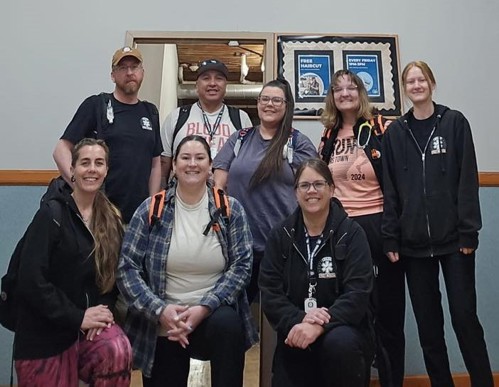New Collaboration Brings Narcan, Street Medicine, Peer Support Services to Treatment Courts
PRESS RELEASE
For Immediate Release: May 15, 2025
Contact: Alisa Bousa, Public Information Officer, Alisa.Bousa@ujs.state.sd.us, 605.773.2031
New Collaboration Brings Narcan, Street Medicine, Peer Support Services to Treatment Courts

PIERRE, S.D.—In a move to strengthen recovery outcomes and save lives, a new initiative has been launched to embed street medicine services, harm reduction supplies and peer support into the fabric of South Dakota’s treatment court system. This collaboration marks a critical shift toward meeting treatment court participants where they are—both medically and emotionally.
The program now includes the routine implementation of Narcan (naloxone), a life-saving medication that rapidly reverses opioid overdoses, as well as access to addiction medications, harm reduction tools, and on-the-street medical care provided by compassionate providers who understand the complexities of recovery.
May is National Treatment Court Month. South Dakota’s 17 treatment courts help participants become healthy, productive citizens and reduce crime by offering evidence-based treatment and accountability to people with substance use and mental health disorders. When one person rises out of addiction and into recovery, we all rise.
“Our treatment court participants face incredible challenges,” said Dr. Melissa Dittberner, executive director of Midwest Street Medicine and a faculty member at the University of South Dakota (USD) in Vermillion. “We are better when we work together—bridging health care, harm reduction and justice systems to meet people exactly where they are and support them with dignity. This partnership allows us to walk alongside individuals throughout their recovery journey.”
The new project is part of a $2 million Substance Abuse and Mental Health Services Administration (SAMHSA) grant secured by USD’s Department of Addiction Counseling & Prevention. The goal is to expand substance use disorder treatment and recovery support for Second Circuit Drug Court participants.
The initiative has significantly increased access to medical services, expanded availability of peer specialists, and ensures participants are connected to essential resources during one of the most vulnerable phases of their lives. This innovative model not only reduces barriers to care but also strengthens public safety, improves participant outcomes, and aligns with national best practices for diversion and support-based justice.
South Dakota’s treatment courts are administered by the Unified Judicial System and include drug court, DUI court, veterans court and mental health court. Learn more at https://ujs.sd.gov/programs-services/treatment-courts.
Photo Caption: Midwest Street Medicine volunteers performing street medicine services rounds on May 8, 2025, in Sioux Falls.
—30—
About South Dakota Courts: The Unified Judicial System (UJS) consists of the Supreme Court, Circuit Courts and State Court Administrator’s Office. The Supreme Court is the state’s highest court and final decision maker on South Dakota law. The Circuit Courts are the state’s trial courts where criminal proceedings and civil litigation are handled. The State Court Administrator’s Office provides centralized administrative assistance and support services for the South Dakota judiciary. Learn more at https://ujs.sd.gov.
